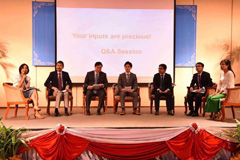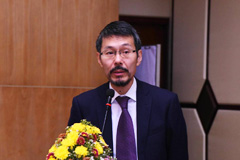Implications of Empirical Research for a Shift of Cambodian Economy Away from Dollar Presented by Research Fellow Ken Odajima
2016.12.16
A seminar was held on October 20, 2016 in Cambodia’s capital Phnom Penh to present the results of the “Empirical Study on the Promotion of Home Currency in Cambodia,” a research project conducted jointly between the JICA Research Institute and the National Bank of Cambodia (NBC). The study examined the background and factors of the “dollarization” of Cambodia’s economy, using data from households, enterprises, and financial institutions. The project aims to encourage policies that promote use of local currency (the riel).
Approximately 250 people attended the seminar, including representatives from the government and local banks, and researchers from universities and other research organizations. NBC Deputy Governor Neav Chanthana and JICA Cambodia Office Chief Representative Itsu Adachi gave the opening address. Presentations were given by Ken Odajima, JICA-RI executive senior research fellow, Daiju Aiba, former JICA-RI research assistant (Japan Society for the Promotion of Science DC2), and representatives from NBC.

Panelists answer questions from the floor
During the seminar, Pagna Sok, NBC Chief of Section, gave an overview of the research project. Pagna explained, “As part of this research project, we conducted surveys of 2,273 households, 856 enterprises, and 82 currency exchange agencies (money changers) throughout Cambodia, from October 2014 to January 2015. In addition, from April 2015 to July 2015 we gathered financial data at the branch office level from 15 local commercial banks and microfinance organizations.”
Odajima presented the results of the household survey, and showed that the ratio of dollar utilization in income, expenditures, assets, and borrowings in Cambodian households differed by income level and region. In general, the survey showed a tendency for utilization of the dollar to be higher in urban areas of the country such as Phnom Penh and Siem Reap, and lower in rural areas. However, the high level of dollar utilization anticipated in the dollarization ratio measured with macro indicators was not seen. It was found that dollar is frequently exchanged for riel then used. Borrowings, on the other hand, showed an overwhelmingly high ratio for the dollar, resulting in a mismatch in the currency of income in some households, putting them under foreign exchange risk. In that context, it was found that the majority of households support the government’s promotion of riel utilization.

Ken Odajima, JICA-RI executive senior research fellow
Aiba used financial data gathered from approximately 550 branch offices of 15 banks to show the current state of the financial dollarization of Cambodia, the overall chronological path, and changes on the local level. He explained the possible factors involved. He also pointed out that deposits in the riel were increasing in rural areas, particularly in microfinance organizations. He also said “Cambodian banks distribute dollars accumulated in cities to rural branches, but they do not distribute accumulated riel to those branches. It is necessary to provide incentives to distribute riel to rural areas.”

Daiju Aiba, former JICA-RI research assistant
NBC official Ranareth Tha used data from approximately 870 companies to show the results of the survey of Cambodian businesses. The survey found that dollarization had progressed in business activities more than in households, and that there was a significant mismatch of currency between revenue and borrowing. The mismatch was particular apparent in rural areas. This suggested that there are many businesses facing foreign exchange risk.
In regard to research on currency exchange agencies, Soklong Leng, NBC deputy chief of division, explained that banks do not substantially participate in the currency market in Cambodia, and that the actions of currency exchange agencies impact the costs of businesses. As a result, the ratio of use of foreign and local currencies is affected as well.
Khou Vouthy, director of NBC's Economic Research and International Cooperation Department, summarized the promotion of usage of the riel that has been implemented by the government, and pointed out possibilities for more concrete policies based on the current results. He spoke about wage payments in riel, price quotations in riel, issuing of higher riel currency notes, promotion of lending in riel by financial institutions, promotion of household financial inclusion through promotion of use of the riel, promotion of financial literacy, and provision of riel exchange risk hedging instruments.
In response to the question “Won’t promoting use of local currency cause a slowing of the flow of capital from outside Cambodia through direct investment?” Odajima explained “That’s possible, but looking at dollarization from a macro perspective, there are likely both advantages and disadvantages. A promotion of use of local currency should not be implemented in an abrupt manner, but instead it is important to do it from a long-term perspective, achieving it gradually to minimize and control adverse effects.” He also touched on plans for future studies and the importance of further increasing the capacity of NBC.

事業事前評価表(地球規模課題対応国際科学技術協力(SATREPS)).国際協力機構 地球環境部 . 防災第一チーム. 1.案件名.国 名: フィリピン共和国.

事業事前評価表(地球規模課題対応国際科学技術協力(SATREPS)).国際協力機構 地球環境部 . 防災第一チーム. 1.案件名.国 名: フィリピン共和国.

事業事前評価表(地球規模課題対応国際科学技術協力(SATREPS)).国際協力機構 地球環境部 . 防災第一チーム. 1.案件名.国 名: フィリピン共和国.

事業事前評価表(地球規模課題対応国際科学技術協力(SATREPS)).国際協力機構 地球環境部 . 防災第一チーム. 1.案件名.国 名: フィリピン共和国.

事業事前評価表(地球規模課題対応国際科学技術協力(SATREPS)).国際協力機構 地球環境部 . 防災第一チーム. 1.案件名.国 名: フィリピン共和国.
scroll